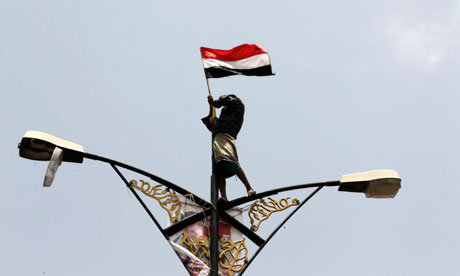The burning question in Yemen is: what next? This is how the leading committee of the revolution sees the transition
By Tariq Aldoais

By Tariq Aldoais

An anti-government protester raises Yemen's national flag on a lamp-post during a demonstration in the southern city of Taiz, June 16, 2011. Photograph: Khaled Abdullah/Reuters
It has been difficult for many to accept the possibility of a peaceful revolution in a country like Yemen, given its tribal makeup and the preponderance of weapons and illiteracy.
But Yemenis have surprised the sceptics by calling for the peaceful overthrow of a regime that had lasted for 33 years, and had isolated them from the modern world. The revolution was able to expand its influence to include all districts. This gained it popular support along with regional and international backing, while it continued to triumph over President Saleh's forces – even winning over a number of his inner circle.
This caused the regime to brutally escalate its repression and violence, targeting the protest squares; barbaric assaults left hundreds dead and thousands wounded, while still more were detained or went missing.
In the city of Taiz there was a massacre. In the dead of night, the square was cordoned off and heavy weapons rained down shells. Teargas was then used as the square was stormed, and protesters were burned in their tents. Approximately 100 civilians were killed and thousands injured. There was collective punishment too: water, electricity and gas supplies were cut off.
The regime was attempting to push the country into civil war, but in light of the intense popular desire for change and the awareness of the dangers of division, it failed. The conflict in Yemen is between the people and the remnants of the current regime. It is a struggle of willpower; popular determination versus that of the ruling power; there is no principal rift within the people themselves that could be cause for a civil war.
The ongoing demonstrations and protests have also highlighted the Yemeni people's aptitude and initiative. On Fridays, which are described as "days of protest and demonstration" and are often given specific names such as "the Friday of determination and dignity", youth leaders demonstrate proficiency in oratory and methods for mobilising the masses. Others bring the days and nights to life with various contributions; creative, theatrical, literary and poetic.
One of the burning questions has been: what next? What happens when the revolution is successful? During these days of protest, and through a continuous dialogue between all the young people and others who gather week after week, the leading committee of the revolution has developed a vision for the transitional stage in Yemen. It is as follows:
First, we need to form a temporary presidential council comprised of five to seven members recognised for their integrity, experience and competence and who will represent all national movements.
Second, the transitional period must not exceed nine months; it will begin with a constitutional announcement bringing the current constitution to an end; dissolving the consultative council and the council of deputies; guaranteeing fundamental rights and freedoms, foremost of which are freedom of expression, the press and information, and the right to congregate, organise and demonstrate.
Third, the provisional presidential council will assume the following functions: it will take the place of the president of the republic during the transitional period and will integrate the political and national security apparatus into one national security service to ensure the security of the country and respect for human rights.
Fourth, a transitional national council will be formed in which young people, and national and political groupings are represented. This council will create a transparent forum for national dialogue that discusses all important issues – foremost among them the south and Saada, with a view to finding a just resolution. The council will also set up a committee of experts to draft a new constitution so as to ensure the establishment of a modern civil state based on the principles of the peaceful rotation of power, political pluralism, respect for human rights and the freedom of its citizens. Another committee will assume responsibility for administering and overseeing the constitutional referendum and parliamentary elections.
Fifth, the judiciary will be restructured to ensure its independence from the legislative and executive authorities.
Sixth, the transitional presidential council will bring to trial all those who killed or ordered the killing or injury of participants in the revolution. Exceptional courts and special prisons will be abolished, and all political prisoners and prisoners of conscience released.
Finally, the assets of Saleh and his family will be frozen, along with those belonging to other members of the former regime; and all looted public and private funds and property will be returned.
Having reached the threshold of victory, the popular Yemeni revolution salutes all those who are free, along with the world that stood by us in our revolution. We hope to God that we achieve our demands and that we see Yemen happy and beautiful.
-This commentary was published in The Guardian on 16/06/2011
-Dr Tariq Aldoais is an activist in the Yemeni youth revolution and a doctor, heading the revolution's field hospital at Tahrir Square in Sana'a
-Dr Tariq Aldoais is an activist in the Yemeni youth revolution and a doctor, heading the revolution's field hospital at Tahrir Square in Sana'a
No comments:
Post a Comment